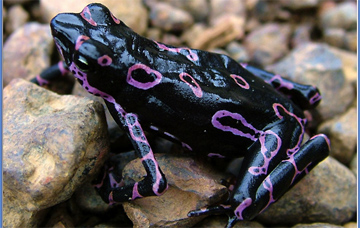Mining gets approval despite recent wildlife discoveries in Suriname
Mining gets approval despite recent species discoveries
Rhett A. Butler, mongabay.com
June 13, 2007
Suriname will allow mining in a highly biodiverse tract of forest where 24 previously unknown species were recently discovered. The decision had been expected.
Joyce Amarello Williams, Suriname’s environment minister, said Wednesday that the government will take measures to protect wildlife while encouraging open-pit mining, according to the Associated Press.
“It is a matter of finding a right and responsible balance between exploiting our natural resources to our benefit and preserving our biodiversity, which is an important part of our wealth,” Williams told The Associated Press.
Williams’ comments come nine days after Conservation International announced the results of extensive surveys that turned up dozens of “new” species including a psychedelic purple-and-black toad, 12 kinds of dung beetles, and six species of fish. The research was sponsored by two mining companies, BHP-Billiton Maatschappij Suriname (BMS) and Suriname Aluminium Company LLC (Suralco) (a subsidiary of Alcoa Inc.), hoping to mine the area for bauxite, the raw material used to make aluminum.

A previously unknown species of toad, possibly of the Atelopus genus, discovered during the Nassau plateau in Suriname. Atelopus toads have been particularly affected by the deadly chytrid fungus. Photo © Paul Ouboter |
At the time of the announcement, Conservation International said the survey will help “give miners guidance on protecting unique plants and animals during potential future development.”
“Where current economic imperatives dictate mining, our responsibility is to ensure that operations are kept within the bounds of our benchmarks,” said Conservation International-Suriname Executive Director Ambassador W. Udenhout.
Research in other parts of the country suggest that large mining firms–in the glare of the international spotlight–may be better stewards of the environment than informal miners who are accountable to no one and pollute streams with mercury and tear up streambeds in search of gold. Such miners, known as garimpeiros in Brazil, have caused significant damage in neighboring countries, including Brazil, Venezuela, Guyana, and French Guiana. They are also known to bring violence and disease to areas inhabited by indigenous groups.
“Compared to small-scale mining, companies such as Cambior (or Suralco and Rosebel in Suriname) are doing a far better job at protecting the environment” said Dr. Pierre-Michel Forget, a biologist who has worked in the region for more than 20 years. “For example they take steps to prevent hunting in and around mining areas. They also offer decent life and salary for workers, seek to minimize their overall impact when building roads, and plan to rehabilitate the damaged destroyed habitats. Though the impact of their activities remain colossal, it is concentrated at one location and not diluted across the entire rainforest of the Guianas like that of the garimpeiros.”
Discoveries show the need for conservation
Conservation International said the discoveries should provide impetus for protecting Suriname’s biodiverse forests, which are largely intact, but face increasing pressure from loggers and illegal gold miners. The World Bank recently ranked Suriname as among the 17 potentially richest countries in the world, given its deposits of gold, oil, diamond, and other natural resources.
“Suriname has some of the Amazon’s most pristine and intact rain forest, which offers huge potential for scientific research and economic investment in carbon sequestration, as well as the sustenance it has always provided local communities,” said Leeanne Alonso, vice president of Conservation International. “Our study will be a vital component in determining how to promote economic development in Suriname while protecting the nation’s most valuable natural assets.”
Suriname is one of the least densely populated countries on Earth. Only about 5 percent of the country’s population lives in its forests, which cover more than 90 percent of its territory.
Related articles
Mining in Venezuelan Amazon threatens biodiversity, indigenous groups
Troubles are mounting in one of Earth’s most beautiful landscapes. Deep in the Venezuelan Amazon, among ancient forested tabletop mountains known as tepuis, crystalline rivers, and breathtaking waterfalls, illegal gold miners are threatening one of world’s largest remaining blocks of wilderness, one that is home to indigenous people and strikingly high levels of biological diversity. As the situation worsens — a series of attacks have counted both miners and indigenous people as victims — a leading scientific organization has called for the Venezuelan government to take action.
Europe’s largest tropical rainforest invaded by gold miners
As Europe frets over climate change and deforestation, threats to “Europe’s largest tropical rainforest” are mounting, according to reports from French Guiana. While French Guiana is best known for its infamous Devil’s Island penal colony and as the main launch site for the European Space Agency, which is responsible for more than 50% of the state’s economy activity, most of the territory is covered with lowland tropical rainforest. French Guiana’s forests are biologically rich with some 1,064 known species of amphibians, birds, mammals and reptiles, and 5,625 species of vascular plants according to figures from the World Conservation Monitoring Center.